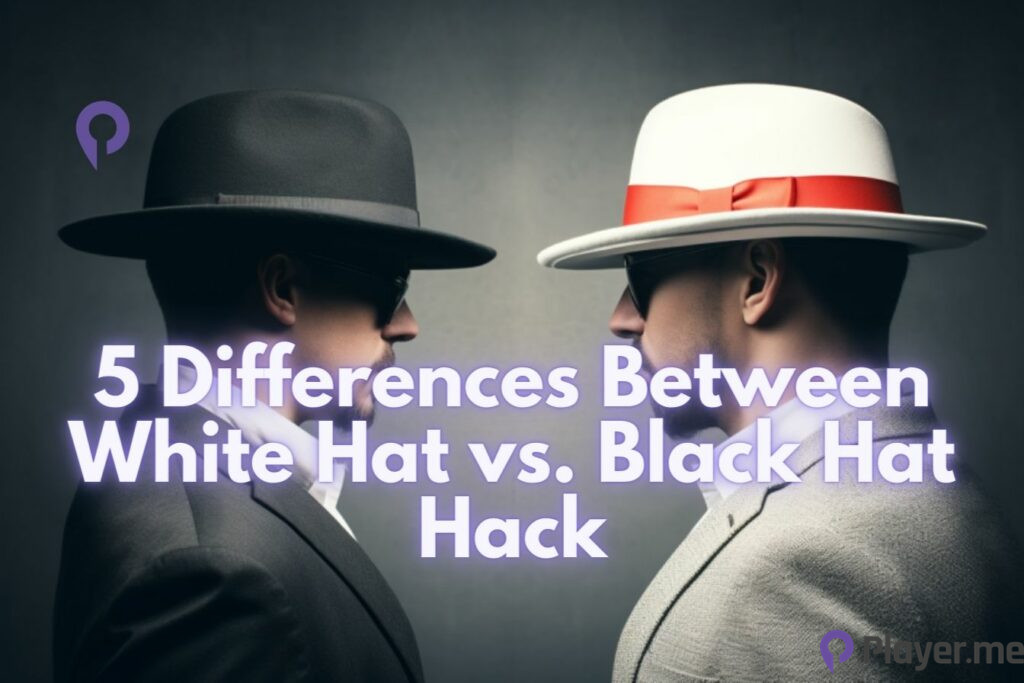Technology is getting even more advanced compared to the olden days. In our daily routine, we might not be aware of how great the hacking skills that happen around us. It has been happening around the clock for even a second. A hacker is an individual with advanced computer skills who can explore and manipulate computer systems. Hackers can be either Black hat (Malicious) or White hat (Ethical).

Black hat hackers engage in illegal activities for personal gain, while white hat hackers use their skills for positive purposes, improving cybersecurity and protecting systems. Ethical hackers conduct authorised security assessments, while unauthorised hacking is illegal and can lead to severe consequences.
Also Read: Quantum Computing: Unleashing Quantum Power for Lightning-Fast Problem-Solving
Being Black Hat and White Hat
Black hat and white hat are terms commonly used in the context of cybersecurity and hacking to describe different ethical approaches and intentions of individuals engaged in computer-related activities. Here are the top five differences between black hat and white hat.
Top 5 Differences Between White Hat vs Black Hat Hack
1) Ethical Hack
Mostly bad hackers are named after black hat, who engage in hacking and cybersecurity activities with malicious intent. They often seek to exploit vulnerabilities in computer systems, networks, or software for personal gain, causing harm or damage to individuals, organisations, or systems.
On the other hand, white hat hackers, also known as ethical hackers or security professionals, use their hacking skills for positive and constructive purposes. They work to identify and fix security vulnerabilities, helping individuals and organisations enhance their cybersecurity and defend against potential threats.
2) Legality in Hacking Activities
Black hat hackers engage in hacking and cybersecurity activities with malicious intent. They often seek to exploit vulnerabilities in computer systems, networks, or software for personal gain, causing harm or damage to individuals, organisations, or systems. Besides, black hat also loves to get involved in the dark web use the dark web as a platform to share malware and ransomware, and sell hacking tools and services.

White hat hacking is legal since it involves authorised testing and security assessments. Ethical hackers usually work under legal frameworks and with the explicit permission of the system owners to find and fix vulnerabilities.
Also Read: AI-Assisted Creativity: Exploring AI’s Role in Art, Music, and Design
3) Motivation
What is the cause of being a black hat? They are primarily driven by personal gain, such as financial profit, acquiring sensitive information for blackmail or fraud, or causing disruption and chaos for their amusement.
White hat hackers are motivated by a desire to improve cybersecurity and protect individuals and organisations from cyber threats. Their goal is to make the digital world a safer place for everyone.
4) Tools and Techniques
As for black hat, there are a few tools that they are most likely to use, such as Man-in-the-Middle (MITM) Attacks, DDoS (Distributed Denial of Service) Attacks, SQL Injection (SQLi), and Password Cracking as their weapon . Their methods often involve stealth and evasion to avoid detection. It’s important to remember that using these tools and techniques for malicious purposes is illegal and unethical.

Simultaneously, white hat hackers use similar tools and techniques, but they utilise them legally and responsibly to help the people in society. They employ penetration testing, vulnerability assessments, and ethical hacking practices to identify weaknesses and provide recommendations for improvement.
Also Read: 5G Networks: Empowering the World with Lightning-Fast Connectivity
5) Community Perception
In the aspect of society, white hat hackers are respected within the cybersecurity community for their knowledge, skills, and commitment to protecting digital assets. They are considered valuable assets to organisations and play a crucial role in maintaining a safer digital environment.
Black hat hackers are generally viewed negatively due to their harmful actions and illegal activities. They are seen as threats to privacy, security, and the stability of online systems.
Final Remarks
Overall, the term Hacker encompasses a broad spectrum of individuals with varying skills, motivations, and intentions. Ethical hacking is an important field that helps improve digital security, while illegal hacking poses significant risks and threats to individuals and organisations.
Frequently Asked Questions
Can Black Hat Hackers Become White Hat Hackers?
Yes, some individuals who engaged in Black hat hacking activities in the past have chosen to switch sides and become ethical hackers. They can use their knowledge and experience to help protect systems and enhance cybersecurity.
Do White Hat Hackers Get Paid for Their Services?
Yes, white hat hackers, also known as security professionals or ethical hackers, often get paid for their services. They may work as consultants or employees for organisations to conduct security assessments and provide recommendations for improvement.
Are There Any Laws Against Black Hat Hacking?
Yes, most countries have strict laws against hacking, unauthorised access, data theft, and other cybercrimes. Engaging in Black hat hacking activities can lead to severe legal consequences. With Federal sentencing guidelines recommend a prison sentence of up to 20 years for those convicted of cyber crime offenses.
Author Profile
Latest entries
 GAMING2024.06.12Top 4 Female Tekken 8 Fighters to Obliterate Your Opponents in Style!
GAMING2024.06.12Top 4 Female Tekken 8 Fighters to Obliterate Your Opponents in Style! NEWS2024.03.18Elon Musk’s SpaceX Ventures into National Security to Empower Spy Satellite Network for U.S.
NEWS2024.03.18Elon Musk’s SpaceX Ventures into National Security to Empower Spy Satellite Network for U.S. GAMING2024.03.17PS Plus: 7 New Games for March and Beyond
GAMING2024.03.17PS Plus: 7 New Games for March and Beyond GAMING2024.03.17Last Epoch Necromancer Builds: All You Need To Know About It
GAMING2024.03.17Last Epoch Necromancer Builds: All You Need To Know About It





